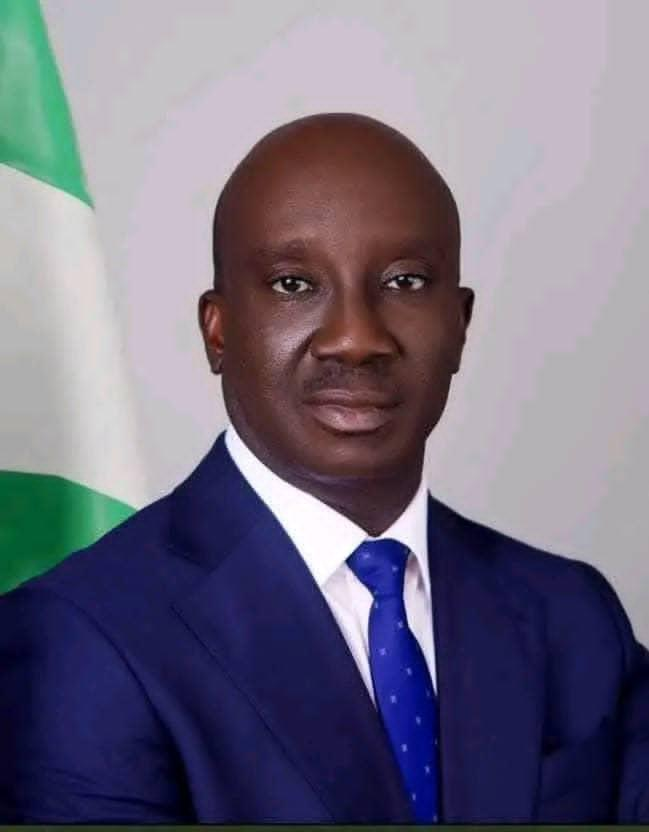It is often said that “when the roots are deep, there is no reason to fear the wind.” Six months after stepping into the stormy shoes of governance, Senator Monday Okpebholo has proven that leadership is not about noise but about substance. He did not come in as a messiah with lofty promises wrapped in sweet speeches. Instead, he came with a broom, a hoe, and a plan—to clear the debris of the past and rebuild Edo State with his hands in the soil and his ears to the ground.
To understand the significance of Okpebholo’s leadership, one must revisit where Edo has come from. For eight years, the people of Edo were like tenants in their own house. Governance became a monologue—a conversation among the elite, with little regard for the voices of ordinary citizens. Development was spoken of in press conferences but absent on the streets. Roads were death traps. Civil servants were demoralized. Food became gold in the market. Schools were in ruins. Hospitals were gasping for breath. Security became a private affair. The people were left holding the empty shell of promises.
But Governor Monday Okpebholo came in like a farmer who understands that no matter how lush a forest looks, it cannot feed a hungry man. He is going back to the basics—fixing what matters. In just six months, a fresh wind of responsible governance is blowing through the state. The drums of disconnected leadership have gone silent, and the rhythm of accountability has taken over.
Governor Okpebholo has chosen the narrow path—a path often ignored by those who prefer skyscrapers in the sky to pothole-free roads. He understands that no man eats blueprints. The real test of governance is not in ribbon-cutting ceremonies but in whether a farmer in Iruekpen can get his produce to the market without getting stuck in the mud, or whether a civil servant in Ikpeshi can afford a meal after salary.
From day one, Governor Okpebholo made it clear that he would not be governed by ego or revenge. Unlike his predecessor, who often seemed more interested in vendettas than value, the current governor has shown maturity. He is fixing roads, not picking fights. He is restoring dignity, not renaming institutions to settle political scores.
One of the greatest indicators of a functioning government is the strength of its civil service. For years, Edo’s civil service was reduced to a ghost town. The previous administration preferred consultants who drained the system without transferring knowledge. The state became a feeding ground for outsiders while the real engine room of governance—the civil servants—were sidelined and starved of opportunities.
Governor Okpebholo saw the rot and went to work. He began recruiting qualified personnel, reversing the decay. The handover chaos with the state’s IT systems is a metaphor for how broken things were. Obaseki’s IT consultant refused to release login details and digital assets of the state, exposing a system built on control rather than continuity. But Okpebholo’s team rolled up their sleeves and began the slow but steady process of digital recovery. “When a pot breaks, you don’t cry over the clay—you mold another one.”
When Okpebholo said during his campaign that “Edo will become a construction site,” many dismissed it as political talk. But he has matched words with action. Roads that had become symbols of abandonment are being rehabilitated. He is not waiting for the federal government to fix federal roads. He understands that a bad road doesn’t ask if it’s federal or state before it kills.
In Esanland, in Edo South, and in Edo North—construction is ongoing. Rural communities are being reconnected. Markets are springing to life. Mobility is no longer a punishment. The difference is as clear as day. “A man who repairs the path to his neighbor’s farm is planting goodwill for the next harvest.”
Perhaps the most shameful chapter of the past government was its treatment of education. Tertiary institutions were reduced to battlegrounds. Ambrose Alli University (AAU), once a proud academic citadel, became a theater of strikes. Lecturers became street protesters. Monthly subventions were slashed from respect to ridicule—down to 41 million naira. A governing council was denied the school; instead, a so-called Special Intervention Team (SIT) took over, adding insult to injury.
Governor Okpebholo walked into that mess and began cleaning house. He restored funding and upped it. He listened to stakeholders. He gave AAU a chance to breathe again. Today, lecturers are in their classrooms, not on the streets. The ghost of vendetta is giving way to the light of vision. “When a leader fights knowledge, ignorance wins.” Okpebholo knows better.
In a time when the cost of living is squeezing the average Nigerian, food security cannot be treated as a campaign slogan. Okpebholo has backed his words with action. Over N70 billion was earmarked in the state budget for agriculture. Thousands of hectares of arable land have been acquired across Edo North, Central, and South. Farmers are being empowered. Food production is being scaled.
This is not trial and error. It is intentional policy. He understands that “he who controls the seeds controls the stomachs.” The government is partnering with stakeholders to ensure that Edo does not just survive but thrives as a food-producing state.
A governor’s most sacred duty is the safety of his people. Insecurity had eaten deep into Edo’s peace—cultism, kidnapping, herdsmen encroachment. But Governor Okpebholo did not sit behind a desk issuing statements. He signed laws. He enforced them. Houses linked to cultism and kidnapping were demolished. Arrests were made. Awareness campaigns were launched. Citizens began to feel the presence of government again.
With the Anti-Cultism and Anti-Kidnapping Laws in place and their enforcement in motion, a new message has been sent to criminal elements: “Edo is no longer a safe haven for evil.”
Six months may seem short in the life of a government, but it is enough to take a bearing. Governor Okpebholo is not performing magic. He is simply returning to common sense governance—listening, acting, and staying connected to the people. He is proving that “you don’t need a megaphone to build a legacy—just results.”
Edo State is not perfect. There are still battles to fight, holes to fill, and dreams to fund. But one thing is clear: the train has left the station, and it is headed in the right direction. For the first time in years, Edo people are beginning to believe again—not in empty slogans, but in the power of sincere, focused leadership.
And that, in itself, is a victory worth celebrating.
Oba ghato kpere, Ise!




